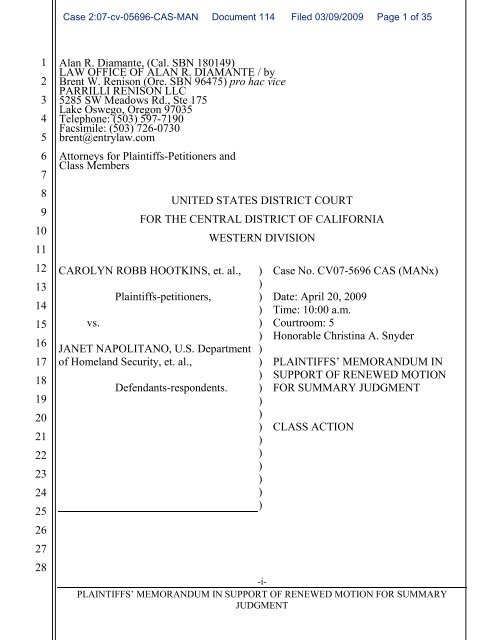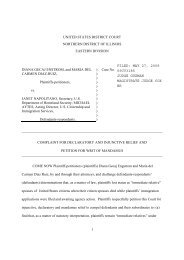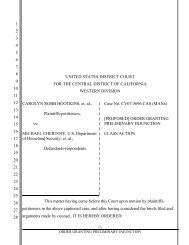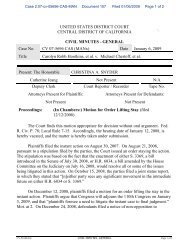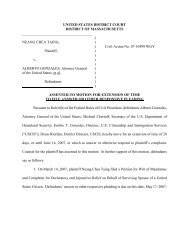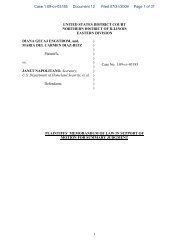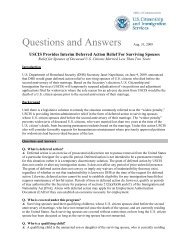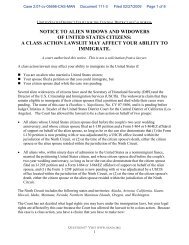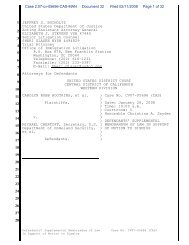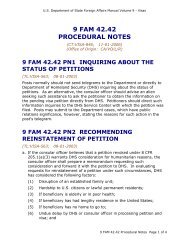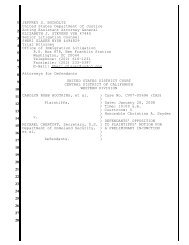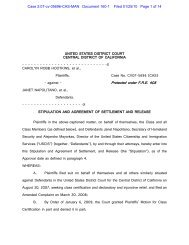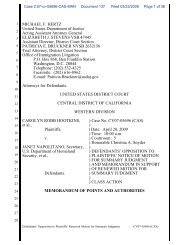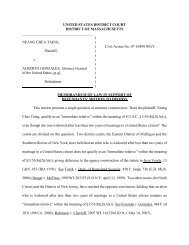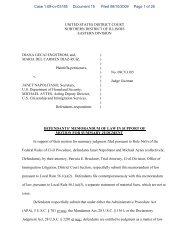Plaintiffs file Renewed Motion for Summary Judgment - Surviving ...
Plaintiffs file Renewed Motion for Summary Judgment - Surviving ...
Plaintiffs file Renewed Motion for Summary Judgment - Surviving ...
Create successful ePaper yourself
Turn your PDF publications into a flip-book with our unique Google optimized e-Paper software.
Case 2:07-cv-05696-CAS-MAN Document 114 Filed 03/09/2009 Page 1 of 35<br />
1<br />
2<br />
3<br />
4<br />
5<br />
6<br />
7<br />
8<br />
9<br />
10<br />
11<br />
12<br />
13<br />
14<br />
15<br />
16<br />
17<br />
18<br />
19<br />
20<br />
21<br />
22<br />
23<br />
24<br />
25<br />
26<br />
27<br />
28<br />
Alan R. Diamante, (Cal. SBN 180149)<br />
LAW OFFICE OF ALAN R. DIAMANTE / by<br />
Brent W. Renison (Ore. SBN 96475) pro hac vice<br />
PARRILLI RENISON LLC<br />
5285 SW Meadows Rd., Ste 175<br />
Lake Oswego, Oregon 97035<br />
Telephone: (503) 597-7190<br />
Facsimile: (503) 726-0730<br />
brent@entrylaw.com<br />
Attorneys <strong>for</strong> <strong>Plaintiffs</strong>-Petitioners and<br />
Class Members<br />
UNITED STATES DISTRICT COURT<br />
FOR THE CENTRAL DISTRICT OF CALIFORNIA<br />
CAROLYN ROBB HOOTKINS, et. al.,<br />
vs.<br />
<strong>Plaintiffs</strong>-petitioners,<br />
JANET NAPOLITANO, U.S. Department<br />
of Homeland Security, et. al.,<br />
Defendants-respondents.<br />
WESTERN DIVISION<br />
)<br />
)<br />
)<br />
)<br />
)<br />
)<br />
)<br />
)<br />
)<br />
)<br />
)<br />
)<br />
)<br />
)<br />
)<br />
)<br />
)<br />
)<br />
)<br />
Case No. CV07-5696 CAS (MANx)<br />
Date: April 20, 2009<br />
Time: 10:00 a.m.<br />
Courtroom: 5<br />
Honorable Christina A. Snyder<br />
PLAINTIFFS’ MEMORANDUM IN<br />
SUPPORT OF RENEWED MOTION<br />
FOR SUMMARY JUDGMENT<br />
CLASS ACTION<br />
-i-<br />
PLAINTIFFS’ MEMORANDUM IN SUPPORT OF RENEWED MOTION FOR SUMMARY<br />
JUDGMENT
Case 2:07-cv-05696-CAS-MAN Document 114 Filed 03/09/2009 Page 2 of 35<br />
1<br />
2<br />
3<br />
4<br />
5<br />
6<br />
7<br />
8<br />
9<br />
10<br />
11<br />
12<br />
13<br />
14<br />
15<br />
16<br />
17<br />
18<br />
19<br />
20<br />
21<br />
22<br />
23<br />
24<br />
25<br />
26<br />
27<br />
28<br />
TABLE OF CONTENTS<br />
MEMORANDUM OF POINTS AND AUTHORITIES ..................................... 1<br />
I. STANDARD FOR SUMMARY JUDGMENT ......................................... 1<br />
II. BACKGROUND ....................................................................................... 2<br />
III.<br />
IV.<br />
A. MATERIAL FACTS ............................................................. 2<br />
B. LEGAL AUTHORITY ......................................................... 2<br />
1. Immigration Petition Statute and Regulations ...................... 3<br />
2. Matter of Varela .................................................................... 7<br />
3. Terms Spouse and Marriage .................................................. 9<br />
PLAINTIFFS’ CLAIMS ARE APPROPRIATE FOR RESOLUTION BY<br />
SUMMARY JUDGMENT ...................................................................... 10<br />
A. THE CLEAR LANGUAGE OF THE STATUTE SUPPORTS<br />
PLAINTIFFS’ CLAIMS FOR RELIEF WITHIN THE NINTH<br />
CIRCUIT ............................................................................. 10<br />
1. Defendants’ Interpretation Imports Unlawful Discretionary<br />
Admissions Criteria Into a Nondiscretionary Eligibility<br />
Determination ...................................................................... 11<br />
2. Defendants Interpretation Relies Upon Revocation Regulations<br />
That Are Ultra Vires ............................................................ 18<br />
B. THE CLEAR LANGUAGE OF THE STATUTE SUPPORTS<br />
PLAINTIFFS’ CLAIMS FOR RELIEF OUTSIDE THE<br />
NINTH CIRCUIT ............................................................... 20<br />
NO GENUINE ISSUE OF MATERIAL FACT EXISTS AND PLAINTIFFS<br />
ARE ENTITLED TO A JUDGMENT AS A MATTER OF LAW ........ 28<br />
V. CONCLUSION ........................................................................................ 29<br />
-ii-<br />
PLAINTIFFS’ MEMORANDUM IN SUPPORT OF RENEWED MOTION FOR SUMMARY<br />
JUDGMENT
Case 2:07-cv-05696-CAS-MAN Document 114 Filed 03/09/2009 Page 3 of 35<br />
1<br />
2<br />
3<br />
4<br />
5<br />
6<br />
7<br />
8<br />
9<br />
10<br />
11<br />
12<br />
13<br />
14<br />
15<br />
16<br />
17<br />
18<br />
19<br />
20<br />
21<br />
22<br />
23<br />
24<br />
25<br />
26<br />
27<br />
28<br />
TABLE OF AUTHORITIES<br />
Cases<br />
Anderson v. Liberty Lobby, Inc., 477 U.S. 242, 250 (1986) .............................. 28<br />
Celotex Corp. v. Catrett, 477 U.S. 317, 322 (1986) ............................................ 1<br />
Dabaghian v. Civiletti, 607 F.2d 868 (9th Cir. 1979) .......................................... 7<br />
Freeman v. Gonzales, 444 F.3d 1031 (9th Cir. 2006) ................................ passim<br />
Freeman v. Gonzales, 444. F.3d 1031 (9th Cir. 2006) ................................ 21, 25<br />
Freeman v. USDC, 489 F.3d 966 (9th Cir. 2007) .............................................. 14<br />
Hernandez v. Ashcroft, 345 F.3d 824, 833-34 (9th Cir. 2003) .......................... 13<br />
Lockhart v. Chertoff, 2008 U.S. Dist. LEXIS 889 (D. Ohio 2008) ................... 28<br />
Matter of Alarcon, 20 I&N Dec. 557 (BIA 1992) ............................................... 7<br />
Matter of O, 8 I&N Dec. 295 (BIA 1959) ......................................................... 17<br />
Matter of Sano, 19 I&N Dec. 299 (BIA 1985) .................................................... 8<br />
Matter of Varela, 13 I&N Dec. 453 (BIA 1970) ............................................. 7, 8<br />
Matter of Zaidan, 19 I&N Dec. 297 (BIA 1985) ................................................. 8<br />
Plessy v. Ferguson, 163 U.S. 537 (1896) ............................................................. 9<br />
Robinson v. Napolitano, 554 F.3d 358 (3d Cir. 2009), reh’g denied (2009)21, 24, 26, 27<br />
Rosell v. State Indus. Accident Comm’n, 164 Or. 173, 179, 95 P.2d 726, 729 (Or. 1939) 10<br />
Taing v. Chertoff, 2007 U.S. Dist. LEXIS 911411 (D. Mass 2007) .................. 20<br />
United Steelworkers of Am. v. Phelps Dodge Corp., 865 F.2d 1539, 1542 (9th Cir.), cert<br />
denied, 493 U.S. 809 (1989) ............................................................................. 2<br />
Statutes<br />
§ 1154 ................................................................................................................. 24<br />
§1186a .................................................................................................... 22, 24, 26<br />
-iii-<br />
PLAINTIFFS’ MEMORANDUM IN SUPPORT OF RENEWED MOTION FOR SUMMARY<br />
JUDGMENT
Case 2:07-cv-05696-CAS-MAN Document 114 Filed 03/09/2009 Page 4 of 35<br />
1<br />
2<br />
3<br />
4<br />
5<br />
6<br />
7<br />
8<br />
9<br />
10<br />
11<br />
12<br />
13<br />
14<br />
15<br />
16<br />
17<br />
18<br />
19<br />
20<br />
21<br />
22<br />
23<br />
24<br />
25<br />
26<br />
27<br />
28<br />
8 U.S.C. § 1182(a)(4) ......................................................................................... 16<br />
8 U.S.C. § 1182(a)(4)(C) .................................................................................... 15<br />
8 U.S.C. § 1182(a)(4)(C)(ii) ............................................................................... 16<br />
8 U.S.C. § 1183a ................................................................................................ 16<br />
8 U.S.C. § 1183a(a)(3)(A) .................................................................................. 16<br />
8 U.S.C. § 1183a(c) ............................................................................................ 17<br />
8 USC § 1151 ............................................................................................... 24, 26<br />
8 USC § 1151(b) ......................................................................................... passim<br />
8 USC § 1151(b)(2)(A)(i) ........................................................................... passim<br />
8 USC § 1154 ............................................................................................... 19, 26<br />
8 USC § 1154(a)(1)(A)(i) ..................................................................... 3, 5, 12, 14<br />
8 USC § 1154(a)(1)(A)(ii).................................................................................... 5<br />
8 USC § 1154(b) ............................................................................................ 6, 13<br />
8 USC § 1155 ..................................................................................................... 19<br />
8 USC § 1182(a) ........................................................................................... 13, 14<br />
8 USC § 1183a(f)(5)(B) ..................................................................................... 15<br />
8 USC §1154(a)(1)(A)(i)(I) ................................................................................ 22<br />
8 USC §1154(a)(1)(A)(i)(II) ........................................................................ 22, 26<br />
8 USC §1186a (b)(1)(A)(ii).......................................................................... 22, 25<br />
8 USC §1186a (c)(1)(A) ..................................................................................... 25<br />
8 USC §1186a (c)(4)(B) ..................................................................................... 25<br />
8 USC §1186a (d)(1)(A)(i)(II) ........................................................................... 25<br />
8 USC §1186a (g) ............................................................................................... 25<br />
INA 201(b)(2)(A)(i) ......................................................................................... 3, 5<br />
INA 204(a)(1)(A)(ii) ............................................................................................ 5<br />
INA 213A(f)(5)(B) ............................................................................................. 12<br />
-iv-<br />
PLAINTIFFS’ MEMORANDUM IN SUPPORT OF RENEWED MOTION FOR SUMMARY<br />
JUDGMENT
Case 2:07-cv-05696-CAS-MAN Document 114 Filed 03/09/2009 Page 5 of 35<br />
1<br />
2<br />
3<br />
4<br />
5<br />
6<br />
7<br />
8<br />
9<br />
10<br />
11<br />
12<br />
13<br />
14<br />
15<br />
16<br />
17<br />
18<br />
19<br />
20<br />
21<br />
22<br />
23<br />
24<br />
25<br />
26<br />
27<br />
28<br />
Other Authorities<br />
Black’s Law Dictionary (4th Ed. 1951) ............................................................. 10<br />
Black’s Law Dictionary (6th Ed. 1990) ............................................................. 10<br />
Black’s Law Dictionary (8th Ed. 2004) ............................................................... 9<br />
Rules<br />
AFM Ch. 21.2(a)(4)(B)(2) ........................................................................... 12, 19<br />
Federal Rule of Civil Procedure 56(c) ................................................................. 1<br />
L.R. 7-3 ................................................................................................................. 1<br />
Regulations<br />
8 C.F.R. § 213a.1 ................................................................................................ 17<br />
8 C.F.R. § 213a.2(e)(2)(ii).................................................................................. 17<br />
8 C.F.R. § 3.1(b) (1985) [now 8 C.F.R. § 1003.1(b)] .......................................... 8<br />
8 CFR § 205.2(a)(3)(C)(2) ........................................................................... 18, 20<br />
Constitutional Provisions<br />
Fifth Amendment to the United States Constitution .................................... 14, 19<br />
-v-<br />
PLAINTIFFS’ MEMORANDUM IN SUPPORT OF RENEWED MOTION FOR SUMMARY<br />
JUDGMENT
Case 2:07-cv-05696-CAS-MAN Document 114 Filed 03/09/2009 Page 6 of 35<br />
1<br />
2<br />
3<br />
4<br />
5<br />
6<br />
7<br />
8<br />
9<br />
10<br />
11<br />
12<br />
13<br />
14<br />
15<br />
16<br />
17<br />
18<br />
19<br />
20<br />
21<br />
22<br />
23<br />
24<br />
25<br />
26<br />
27<br />
28<br />
MEMORANDUM OF POINTS AND AUTHORITIES<br />
<strong>Plaintiffs</strong>-petitioners (“plaintiffs”) respectfully submit this<br />
memorandum of points and authorities in support of the motion <strong>for</strong> judgment<br />
as a matter of law pursuant to Federal Rule of Civil Procedure 56(c). On<br />
January 28, 2008, the Court denied plaintiffs’ <strong>Motion</strong> <strong>for</strong> <strong>Summary</strong><br />
<strong>Judgment</strong> without prejudice to the motion being renewed. Pursuant to L.R.<br />
7-17, this renewed motion is being submitted to the Court which heard the<br />
initial motion. Further, due to the passage of time and development of the<br />
case since that ruling, plaintiffs respectfully restate the bulk of their<br />
arguments here, incorporating new developments where appropriate. This<br />
re-statement is not intended to be duplicative. Rather, consolidation of the<br />
arguments in one document is intended to be helpful to the Court and<br />
counsel. This memorandum exceeds the page limitations of L.R. 11-6, but is<br />
within the 35 page limit ordered by the Court (Dkt. # 14). This<br />
memorandum and motion is made following the conference of counsel<br />
pursuant to L.R. 7-3 which took place on February 27, 2009.<br />
I. STANDARD FOR SUMMARY JUDGMENT<br />
Federal Rule of Civil Procedure 56(c) authorizes summary judgment<br />
if “no genuine issue” exists regarding any material fact and “the moving<br />
party is entitled to judgment as a matter of law.” The moving party must<br />
-1-<br />
PLAINTIFFS’ MEMORANDUM IN SUPPORT OF RENEWED MOTION FOR SUMMARY<br />
JUDGMENT
Case 2:07-cv-05696-CAS-MAN Document 114 Filed 03/09/2009 Page 7 of 35<br />
1<br />
2<br />
3<br />
4<br />
5<br />
6<br />
7<br />
8<br />
9<br />
10<br />
11<br />
12<br />
13<br />
14<br />
15<br />
16<br />
17<br />
18<br />
19<br />
20<br />
21<br />
22<br />
23<br />
24<br />
25<br />
26<br />
27<br />
28<br />
show an absence of a genuine issue of material fact. Celotex Corp. v.<br />
Catrett, 477 U.S. 317, 322 (1986). Once the showing is made, the<br />
nonmoving party must “go beyond the pleadings” and designate specific<br />
facts showing a “genuine issue <strong>for</strong> trial.” Id. At 324, citing FRCP 56(e). A<br />
“’scintilla of evidence,’ or evidence that is ‘merely colorable’ or ‘not<br />
significantly probative,’” does not present a genuine issue of material fact.<br />
United Steelworkers of Am. v. Phelps Dodge Corp., 865 F.2d 1539, 1542<br />
(9th Cir.), cert denied, 493 U.S. 809 (1989) (emphasis in original) (citation<br />
omitted).<br />
II.<br />
BACKGROUND<br />
A. MATERIAL FACTS<br />
The U.S. citizen spouses of plaintiffs <strong>file</strong>d petitions to accord<br />
immediate relative status to plaintiffs. As immediate relatives, plaintiffs<br />
sought to apply <strong>for</strong> status as Lawful Permanent Residents, providing the<br />
ability to lawfully reside in the United States, and be allowed to work and<br />
travel. Defendants terminated action on the residency petitions <strong>file</strong>d by<br />
plaintiffs’ U.S. citizen spouses when each died prior to defendants acting on<br />
the petitions.<br />
B. LEGAL AUTHORITY<br />
Defendants claim that plaintiffs were stripped of their status as<br />
-2-<br />
PLAINTIFFS’ MEMORANDUM IN SUPPORT OF RENEWED MOTION FOR SUMMARY<br />
JUDGMENT
Case 2:07-cv-05696-CAS-MAN Document 114 Filed 03/09/2009 Page 8 of 35<br />
1<br />
2<br />
3<br />
4<br />
5<br />
6<br />
7<br />
8<br />
9<br />
10<br />
11<br />
12<br />
13<br />
14<br />
15<br />
16<br />
17<br />
18<br />
19<br />
20<br />
21<br />
22<br />
23<br />
24<br />
25<br />
26<br />
27<br />
28<br />
immediate relative spouses because each suffered the death of the spouse<br />
be<strong>for</strong>e any action was taken on a properly <strong>file</strong>d petition prior to the death.<br />
As the U.S. Court of Appeals <strong>for</strong> the Ninth Circuit has held, the defendants’<br />
position does not comport with the statute. Freeman v. Gonzales, 444 F.3d<br />
1031 (9th Cir. 2006).<br />
1. Immigration Petition Statute and Regulations<br />
Family relationships <strong>for</strong>m the large part of immigration under our<br />
laws established by Congress, and “immediate relatives” have a special<br />
place in the statutes. Immediate relatives are exempt from numerical<br />
limitation, meaning that immigrant visas are immediately available to them<br />
at any time, and they enjoy exemption from many of the restrictions on other<br />
categories. Under section 201(b)(2)(A)(i), of the Immigration and<br />
Nationality Act (INA), 8 USC § 1151(b)(2)(A)(i), 8 USC § 1154(a)(1)(A)(i),<br />
a United States citizen may petition to have his spouse classified as an<br />
immediate relative. The language of 8 USC § 1154(a)(1)(A)(i) is as follows,<br />
“Any citizen of the United States claiming that an alien is entitled to<br />
classification by reason of a relationship described in paragraph (1),<br />
(3), or (4) of section 203(a) or to an immediate relative status under<br />
section 201(b)(2)(A)(i) may <strong>file</strong> a petition with the Attorney General<br />
<strong>for</strong> such classification.”<br />
Under USCIS rules, the <strong>for</strong>m that the citizen <strong>file</strong>s is Form I-130,<br />
Petition <strong>for</strong> Alien Relative (hereinafter “I-130”). <strong>Plaintiffs</strong>’ citizen spouses<br />
-3-<br />
PLAINTIFFS’ MEMORANDUM IN SUPPORT OF RENEWED MOTION FOR SUMMARY<br />
JUDGMENT
Case 2:07-cv-05696-CAS-MAN Document 114 Filed 03/09/2009 Page 9 of 35<br />
1<br />
2<br />
3<br />
4<br />
5<br />
6<br />
7<br />
8<br />
9<br />
10<br />
11<br />
12<br />
13<br />
14<br />
15<br />
16<br />
17<br />
18<br />
19<br />
20<br />
21<br />
22<br />
23<br />
24<br />
25<br />
26<br />
27<br />
28<br />
all concluded such filing, with fee, in accordance with the statute. The<br />
language of the first sentence of INA 201(b)(2)(A)(i), 8 USC §<br />
1151(b)(2)(A)(i), is succinct:<br />
“Immediate Relatives. – For purposes of this subsection, the term<br />
“immediate relatives” means the children, spouses, and parents of a<br />
citizen of the United States, except that, in the case of parents, such<br />
citizens shall be at least 21 years of age.”<br />
As the Court in Freeman noted, only “parents” are “subject to any<br />
limitation, with the grant of immediate relative status being restricted to<br />
those whose citizen child is at least 21 years of age. There is no comparable<br />
qualifier to be a ‘spouse’—that is, a requirement that the marriage must have<br />
existed <strong>for</strong> at least two years.” Freeman, supra, 444 F.3d at 1039. Nowhere<br />
within the definition of immediate relative spouse is the word marriage, or<br />
any quantified time period of marriage. Yet defendants continue to insist<br />
that plaintiffs are stripped of the status of spouse, and there<strong>for</strong>e immediate<br />
relative status, upon the death of the citizen spouse where the marriage has<br />
existed less than two years.<br />
For alien spouses whose citizen spouses have not <strong>file</strong>d an I-130<br />
immigrant petition, the INA provides a separate self-petitioning right:<br />
“In the case of an alien (and each child of the alien) who was the<br />
spouse of a citizen of the United States <strong>for</strong> at least two years at the<br />
time of the citizen’s death and was not legally separated from the<br />
citizen at the time of the citizen’s death, the alien shall be considered,<br />
-4-<br />
PLAINTIFFS’ MEMORANDUM IN SUPPORT OF RENEWED MOTION FOR SUMMARY<br />
JUDGMENT
Case 2:07-cv-05696-CAS-MAN Document 114 Filed 03/09/2009 Page 10 of 35<br />
1<br />
2<br />
3<br />
4<br />
5<br />
6<br />
7<br />
8<br />
9<br />
10<br />
11<br />
12<br />
13<br />
14<br />
15<br />
16<br />
17<br />
18<br />
19<br />
20<br />
21<br />
22<br />
23<br />
24<br />
25<br />
26<br />
27<br />
28<br />
<strong>for</strong> purposes of this subsection, to remain an immediate relative after<br />
the date of the citizen’s death but only if the spouse <strong>file</strong>s a petition<br />
under section 204(a)(1)(A)(ii) within two years after such date and<br />
only until the date the spouse remarries.”<br />
INA 201(b)(2)(A)(i), 8 USC § 1151(b)(2)(A)(i) (second sentence).<br />
The second sentence of the immediate relative definition creates a time<br />
limitation (at the time of death, the alien must have been a spouse <strong>for</strong> at least<br />
two years) not found in the second sentence, but allows a self petition to be<br />
<strong>file</strong>d under INA 204(a)(1)(A)(ii), 8 USC § 1154(a)(1)(A)(ii),<br />
“An alien spouse described in the second sentence of section<br />
201(b)(2)(A)(i) also may <strong>file</strong> a petition with the Attorney General<br />
under this subparagraph <strong>for</strong> classification of the alien (and the alien’s<br />
children) under such section.” (emphasis supplied)<br />
There<strong>for</strong>e, the citizen spouse <strong>file</strong>s a petition under clause (i) of<br />
1154(a)(1)(A) to accord immediate relative status to his or her spouse under<br />
the first sentence of 1151(b)(2)(A)(i). Separately, the alien spouse (in the<br />
absence of the citizen spouse filing) “also may <strong>file</strong>” a petition under 8 USC §<br />
1154(a)(1)(A)(ii) (clause (ii) instead of (i)) to accord immediate relative<br />
status to him or herself (and his or her children) under the second sentence<br />
of 1151(b)(2)(A)(i), but only if the alien was a spouse <strong>for</strong> at least two years<br />
at the time of the death of the citizen spouse. Congress clearly created “two<br />
different processes, such that one or the other applies – either the citizen<br />
spouse petitions or, if he dies without doing so, the alien widow may do so.”<br />
-5-<br />
PLAINTIFFS’ MEMORANDUM IN SUPPORT OF RENEWED MOTION FOR SUMMARY<br />
JUDGMENT
Case 2:07-cv-05696-CAS-MAN Document 114 Filed 03/09/2009 Page 11 of 35<br />
1<br />
2<br />
3<br />
4<br />
5<br />
6<br />
7<br />
8<br />
9<br />
10<br />
11<br />
12<br />
13<br />
14<br />
15<br />
16<br />
17<br />
18<br />
19<br />
20<br />
21<br />
22<br />
23<br />
24<br />
25<br />
26<br />
27<br />
28<br />
Freeman, supra, 444 F.3d at 1042.<br />
In an attempt to apply the standards of one section to the petition<br />
requirements of another, defendants create tragic and anomalous results.<br />
The Court in Freeman noted that, “[t]he government also tells us that, had<br />
DHS addressed the Freemans’ application be<strong>for</strong>e Mr. Freeman died, the<br />
adjustment of status could have been granted even though they had not been<br />
married <strong>for</strong> two years.” Freeman, supra, 444. F.3d at 1040. Congress<br />
cannot have intended such strange and unjust results.<br />
In the Aytes Memorandum (See Dkt. # 8, Def. Mot. Ex. 1,<br />
“hereinafter Memorandum”), defendant USCIS opines that that 8 USC §<br />
1154(b) supports its interpretation that an I-130 petition cannot be approved<br />
<strong>for</strong> a spouse of a citizen where the alien spouse has outlived her spouse.<br />
That statute states in relevant part,<br />
“After an investigation of the facts in each case…the Attorney<br />
General shall, if he determines that the facts stated in the petition are<br />
true and that the alien in behalf of whom the petition is made is an<br />
immediate relative specified in section 201(b)…approve the<br />
petition…” 8 USC § 1154(b)<br />
Defendants’ position, expressed in the Memorandum, makes much of<br />
the portion of the statute that states “are true” and “is an immediate relative”,<br />
as supporting its view that it is no longer true that a surviving spouse<br />
remains a spouse <strong>for</strong> immediate relative purposes. This section begs the<br />
-6-<br />
PLAINTIFFS’ MEMORANDUM IN SUPPORT OF RENEWED MOTION FOR SUMMARY<br />
JUDGMENT
Case 2:07-cv-05696-CAS-MAN Document 114 Filed 03/09/2009 Page 12 of 35<br />
1<br />
2<br />
3<br />
4<br />
5<br />
6<br />
7<br />
8<br />
9<br />
10<br />
11<br />
12<br />
13<br />
14<br />
15<br />
16<br />
17<br />
18<br />
19<br />
20<br />
21<br />
22<br />
23<br />
24<br />
25<br />
26<br />
27<br />
28<br />
question of whether an alien spouse remains an immediate relative specified<br />
in section 201(b).<br />
Defendants mistakenly rely upon a Board of Immigration Appeals<br />
decision, Matter of Alarcon, 20 I&N Dec. 557 (BIA 1992) <strong>for</strong> the<br />
proposition that “cases are decided based on the facts as they exist on the<br />
date of the decision.” Memorandum, p. 4. The holding in Alarcon,<br />
however, was limited to admissibility issues. Admissibility issues are<br />
determined on a discretionary basis with respect to adjustment of status or<br />
entry pursuant to an immigrant visa. Eligibility issues, on the other hand,<br />
are determined with respect to the citizen’s petition, and are determined at<br />
inception. Dabaghian v. Civiletti, 607 F.2d 868 (9th Cir. 1979). As noted<br />
above, the Attorney General shall approve a petition if the facts stated in the<br />
petition are true. The language of the statute governing I-130 petitions is<br />
mandatory, rather than discretionary.<br />
2. Matter of Varela<br />
Defendants’ position flows from an extra-jurisdictional decision of the<br />
Board of Immigration Appeals, Matter of Varela, 13 I&N Dec. 453 (BIA<br />
1970) (see Exhibit 1). The Board in Varela “summarily ruled that by the<br />
time the non-citizen wife’s adjustment of status petition was being<br />
-7-<br />
PLAINTIFFS’ MEMORANDUM IN SUPPORT OF RENEWED MOTION FOR SUMMARY<br />
JUDGMENT
Case 2:07-cv-05696-CAS-MAN Document 114 Filed 03/09/2009 Page 13 of 35<br />
1<br />
2<br />
3<br />
4<br />
5<br />
6<br />
7<br />
8<br />
9<br />
10<br />
11<br />
12<br />
13<br />
14<br />
15<br />
16<br />
17<br />
18<br />
19<br />
20<br />
21<br />
22<br />
23<br />
24<br />
25<br />
26<br />
27<br />
28<br />
determined, she was no longer [the] spouse of a United States citizen under<br />
§1151 because her husband’s ‘death had stripped her of that status.’”<br />
Freeman, supra, 444 F.3d at 1038 (citing Varela, supra, 13 I&N Dec. at<br />
454). Varela, however, is no longer good law. The Board modified Varela<br />
in a critical respect in Matter of Sano, 19 I&N Dec. 299 (BIA 1985) (See<br />
Exhibit 2). The Board in Sano determined that the BIA itself, due to<br />
regulatory restraints as a court of limited and not general jurisdiction, lacked<br />
jurisdiction to hear an appeal from an individual other than the petitioner.<br />
19 I&N Dec. 299. The Board stated,<br />
“As we recently stated in Matter of Zaidan, 19 I&N Dec. 297 (BIA<br />
1985), the Board’s appellate jurisdiction is defined by the regulations<br />
set <strong>for</strong>th in 8 C.F.R. § 3.1(b) (1985) [now 8 C.F.R. § 1003.1(b)] .<br />
Unless the regulations affirmatively grant us power to act in a<br />
particular matter, we have no appellate jurisdiction over it…We<br />
there<strong>for</strong>e conclude that we lack jurisdiction to address an appeal by<br />
the beneficiary from the denial of a visa petition. Cf. Matter of<br />
Zaidan, supra. To the extent that our decision in Matter of Varela,<br />
supra, conflicts with this conclusion, it is hereby modified.” Matter of<br />
Sano, 19 I&N Dec. at 300-01.<br />
The Board itself determined that its review in Matter of Varela was<br />
“inappropriate.” Sano, supra, at 300. According to the Board, there<strong>for</strong>e, its<br />
previous ruling in Varela on the meaning of the word spouse should not<br />
have been issued, and modified the decision to accord with Sano.<br />
The Ninth Circuit Court of Appeals discussed the level of deference<br />
-8-<br />
PLAINTIFFS’ MEMORANDUM IN SUPPORT OF RENEWED MOTION FOR SUMMARY<br />
JUDGMENT
Case 2:07-cv-05696-CAS-MAN Document 114 Filed 03/09/2009 Page 14 of 35<br />
1<br />
2<br />
3<br />
4<br />
5<br />
6<br />
7<br />
8<br />
9<br />
10<br />
11<br />
12<br />
13<br />
14<br />
15<br />
16<br />
17<br />
18<br />
19<br />
20<br />
21<br />
22<br />
23<br />
24<br />
25<br />
26<br />
27<br />
28<br />
owed to Varela. Freeman, 444 F.3d at 1038. The Court explained that<br />
Varela is an “extra-jurisdictional” decision, suffers from a “lack of statutory<br />
analysis” and is “not a permissible construction of the statute.” Id. Further,<br />
because the Board has decided it has no jurisdiction to ever review this<br />
question again, any interpretation giving life to the decision in Varela<br />
necessarily seals <strong>for</strong> time immemorial that erroneous interpretation. What<br />
an odious world we might live in had Plessy v. Ferguson, 163 U.S. 537<br />
(1896) enjoyed such absolute immunity from re-evaluation.<br />
3. Terms Spouse and Marriage<br />
Defendants’ motion and Memorandum (Dkt # 8) are littered with the<br />
word “marriage”, a word not found in the statute. A close review of 8 USC<br />
§ 1151(b)(2)(A)(i) reveals that the word marriage is not in the first sentence.<br />
Instead, the word “spouse” is found. The term spouse is a common term of<br />
ordinary usage, and is found in the Eighth Edition of Black’s Law<br />
Dictionary (2004): “Spouse. One’s husband or wife by lawful marriage; a<br />
married person….<strong>Surviving</strong> spouse. A spouse who outlives the other<br />
spouse.” Spouse is thus defined to include the term surviving spouse, which<br />
refers to a “spouse” who has outlived the other spouse.<br />
Black’s Law Dictionary, Sixth Edition, published in 1990 and<br />
available at the time of the 1990 INA amendments (which added the self-<br />
-9-<br />
PLAINTIFFS’ MEMORANDUM IN SUPPORT OF RENEWED MOTION FOR SUMMARY<br />
JUDGMENT
Case 2:07-cv-05696-CAS-MAN Document 114 Filed 03/09/2009 Page 15 of 35<br />
1<br />
2<br />
3<br />
4<br />
5<br />
6<br />
7<br />
8<br />
9<br />
10<br />
11<br />
12<br />
13<br />
14<br />
15<br />
16<br />
17<br />
18<br />
19<br />
20<br />
21<br />
22<br />
23<br />
24<br />
25<br />
26<br />
27<br />
28<br />
petitioning rule), defines spouse as “[o]ne’s husband or wife, and ‘surviving<br />
spouse’ is one of a married pair who outlives the other.” Black’s Law<br />
Dictionary (6th Ed. 1990). The Fourth Edition of Black’s, which was<br />
published in 1951 and was the most up-to-date edition available to the<br />
drafters of the 1952 Act (the source of the current immediate relative<br />
definition), broadly defines spouse as “[o]ne’s husband or wife,” a phrase it<br />
specifically derives from Rosell v. State Indus. Accident Comm’n, 164 Or.<br />
173, 179, 95 P.2d 726, 729 (Or. 1939). Black’s Law Dictionary (4th Ed.<br />
1951). Rosell, in turn, defines a widow as “a married woman whose<br />
husband is dead” and a spouse as “one’s wife or husband.” It then defines a<br />
surviving spouse as “the one, of a married pair, who outlives the other.” 164<br />
Or. At 173.<br />
Whether one turns to the most recent 2004 Edition of Black’s Law<br />
Dictionary, the 1990 Edition available at the time of the 1990 amendments,<br />
or the 1951 Edition that was most current when Congress drafted the INA in<br />
1952, “surviving spouse” falls within the definition of “spouse.” Petitioners<br />
have outlived their spouses, though spouses they remain.<br />
III.<br />
PLAINTIFFS’ CLAIMS ARE APPROPRIATE FOR<br />
RESOLUTION BY SUMMARY JUDGMENT<br />
A. THE CLEAR LANGUAGE OF THE STATUTE SUPPORTS<br />
PLAINTIFFS’ CLAIMS FOR RELIEF WITHIN THE NINTH CIRCUIT<br />
-10-<br />
PLAINTIFFS’ MEMORANDUM IN SUPPORT OF RENEWED MOTION FOR SUMMARY<br />
JUDGMENT
Case 2:07-cv-05696-CAS-MAN Document 114 Filed 03/09/2009 Page 16 of 35<br />
1<br />
2<br />
3<br />
4<br />
5<br />
6<br />
7<br />
8<br />
9<br />
10<br />
11<br />
12<br />
13<br />
14<br />
15<br />
16<br />
17<br />
18<br />
19<br />
20<br />
21<br />
22<br />
23<br />
24<br />
25<br />
26<br />
27<br />
28<br />
The Aytes Memorandum does not reflect a lawful interpretation of<br />
the holding in Freeman or the clear language of the statute.<br />
1. Defendants’ Interpretation Imports Unlawful<br />
Discretionary Admissions Criteria Into a<br />
Nondiscretionary Eligibility Determination<br />
With regard to the “Special rule <strong>for</strong> Ninth Circuit cases” outlined<br />
in the Aytes Memorandum (Dkt # 8, Def. Mot. Ex. 1, p. 6, AFM Ch.<br />
21.2(a)(4)(B)(1), hereinafter “Memorandum”), the section purports to follow<br />
Freeman. Yet, according to the Memorandum, the Freeman decision will<br />
apparently not be applied to I-130 petitions unless an I-485 application was<br />
also <strong>file</strong>d be<strong>for</strong>e the death of the petitioner. The Court in Freeman held that,<br />
“an alien widow whose citizen spouse <strong>file</strong>d the necessary immediate relative<br />
petition <strong>for</strong>m but died within two years of the qualifying marriage<br />
nonetheless remains a spouse <strong>for</strong> purposes of 8 USC § 1151(b)(2)(A)(i), and<br />
is entitled to be treated as such when DHS adjudicates her adjustment of<br />
status application.” Freeman, supra, at 1034. The Court did not hold, <strong>for</strong><br />
example, that an alien widow whose citizen spouse <strong>file</strong>d the necessary<br />
immediate relative petition <strong>for</strong>m but died within two years of the qualifying<br />
marriage nonetheless remains a spouse <strong>for</strong> purposes of 8 USC §<br />
1151(b)(2)(A)(i), if she has also <strong>file</strong>d an adjustment of status application.<br />
Such an interpretation is not only in direct conflict with Freeman, but also<br />
-11-<br />
PLAINTIFFS’ MEMORANDUM IN SUPPORT OF RENEWED MOTION FOR SUMMARY<br />
JUDGMENT
Case 2:07-cv-05696-CAS-MAN Document 114 Filed 03/09/2009 Page 17 of 35<br />
1<br />
2<br />
3<br />
4<br />
5<br />
6<br />
7<br />
8<br />
9<br />
10<br />
11<br />
12<br />
13<br />
14<br />
15<br />
16<br />
17<br />
18<br />
19<br />
20<br />
21<br />
22<br />
23<br />
24<br />
25<br />
26<br />
27<br />
28<br />
unsupported by the statute. Defendants’ disagreement with the Freeman<br />
decision has clouded its interpretation of the statute.<br />
Additionally, the Memorandum imports an unlawful requirement<br />
that the beneficiary “present a request under 8 CFR § 205.2(a)(3)(C)(2) <strong>for</strong><br />
humanitarian reinstatement, supported by a properly completed Form I-864<br />
from an individual who qualifies under section 213A(f)(5)(B) of the Act as a<br />
qualifying substitute sponsor” or the petition will automatically be revoked.<br />
Memorandum, p. 7, AFM Ch. 21.2(a)(4)(B)(2). The Memorandum,<br />
there<strong>for</strong>e, makes it clear that defendants will automatically revoke a petition<br />
approved under the Freeman decision <strong>for</strong> reasons not allowed under the<br />
Freeman decision or the statute.<br />
After reviewing 8 USC § 1154(a)(1)(A)(i) and 8 USC §<br />
1151(b)(2)(A)(i), the Court in Freeman concluded that, “through our review<br />
of the language, structure, purpose and application of the statute, that<br />
Congress clearly intended an alien widow whose citizen spouse has <strong>file</strong>d the<br />
necessary <strong>for</strong>ms to be and to remain an immediate relative (spouse) <strong>for</strong><br />
purposes of § 1151(b)(2)(A)(i), even if the citizen spouse dies within two<br />
years of the marriage.” Freeman v. Gonzales, 444. F3d. 1031, 1039 (9th<br />
Cir. 2006). It is the I-130 petition, <strong>file</strong>d under 8 USC § 1154(a)(1)(A)(i),<br />
which establishes eligibility <strong>for</strong> immediate relative status. With respect to<br />
-12-<br />
PLAINTIFFS’ MEMORANDUM IN SUPPORT OF RENEWED MOTION FOR SUMMARY<br />
JUDGMENT
Case 2:07-cv-05696-CAS-MAN Document 114 Filed 03/09/2009 Page 18 of 35<br />
1<br />
2<br />
3<br />
4<br />
5<br />
6<br />
7<br />
8<br />
9<br />
10<br />
11<br />
12<br />
13<br />
14<br />
15<br />
16<br />
17<br />
18<br />
19<br />
20<br />
21<br />
22<br />
23<br />
24<br />
25<br />
26<br />
27<br />
28<br />
the application of the immediate relative to be granted the status of Lawful<br />
Permanent Resident (LPR), certain discretionary grounds of inadmissibility<br />
may apply to bar the adjustment of status (Form I-485) or issuance of an<br />
immigrant visa and admission (Form DS-230). Those inadmissibility<br />
grounds are found at 8 USC § 1182(a). Such grounds of inadmissibility are<br />
wholly separate from the determination of eligibility <strong>for</strong> immediate relative<br />
status under 8 USC § 1154(a)(1)(A)(i) and 8 USC § 1151(b)(2)(A)(i), and<br />
defendants’ attempt to apply inadmissibility standards to the validity of a<br />
petition <strong>for</strong> eligibility is prohibited as a matter of law. The Ninth Circuit has<br />
held that, “determinations that require application of law to factual<br />
determinations are nondiscretionary.” Hernandez v. Ashcroft, 345 F.3d 824,<br />
833-34 (9th Cir. 2003). The determination of immediate relative status is<br />
non-discretionary. Defendants ef<strong>for</strong>ts to import discretionary criteria into<br />
the determination under 8 USC § 1154(a)(1)(A)(i) and 8 USC §<br />
1151(b)(2)(A)(i) are illegal, and subject to judicial review as a matter of law.<br />
Such ef<strong>for</strong>ts also contravene the mandatory language of 8 USC § 1154(b),<br />
“the Attorney General shall…”. Id.<br />
By way of illustration, defendants approved the I-130 petition <strong>file</strong>d<br />
by Robert Freeman on behalf of his wife Carla Freeman, following the<br />
decision of the Ninth Circuit in her case. (Dkt. # 9, Exhibit 3). When<br />
-13-<br />
PLAINTIFFS’ MEMORANDUM IN SUPPORT OF RENEWED MOTION FOR SUMMARY<br />
JUDGMENT
Case 2:07-cv-05696-CAS-MAN Document 114 Filed 03/09/2009 Page 19 of 35<br />
1<br />
2<br />
3<br />
4<br />
5<br />
6<br />
7<br />
8<br />
9<br />
10<br />
11<br />
12<br />
13<br />
14<br />
15<br />
16<br />
17<br />
18<br />
19<br />
20<br />
21<br />
22<br />
23<br />
24<br />
25<br />
26<br />
27<br />
28<br />
adjudicating Mrs. Freeman’s I-485 application, however, defendants applied<br />
a number of grounds of inadmissibility to her application, and denied the<br />
application in discretion. See Dkt. #9, Exhibit 4. Because her I-130 was<br />
approved, however, she was provided the opportunity to renew her I-485<br />
adjustment of status application in removal proceedings. See Freeman v.<br />
USDC, 489 F.3d 966 (9th Cir. 2007). Defendants are free to apply lawful<br />
grounds of inadmissibility to plaintiffs’ applications <strong>for</strong> adjustment of status<br />
or immigrant visas, but it is unlawful to apply grounds of inadmissibility<br />
under 8 USC § 1182(a) to a determination of immediate relative status under<br />
8 USC § 1154(a)(1)(A)(i) and 8 USC § 1151(b)(2)(A)(i). Otherwise, a<br />
spouse who would ordinarily be able to renew an application <strong>for</strong> adjustment<br />
of status in removal proceedings would be barred from that renewal avenue<br />
through the pre-emptive denial of her I-130 petition based only upon<br />
discretionary inadmissibility factors that have no place in a nondiscretionary<br />
eligibility determination. Such a denial results in the denial of due process<br />
of law implicit in the Fifth Amendment to the United States Constitution.<br />
Specifically, defendants purport to require as a prerequisite of I-<br />
130 approval the additional filing of a Form I-864, Affidavit of Support<br />
(hereinafter “Affidavit”) by a “substitute sponsor”, a requirement linked to<br />
the inadmissibility ground found at 8 USC § 1182(a)(4) (“Public Charge”).<br />
-14-<br />
PLAINTIFFS’ MEMORANDUM IN SUPPORT OF RENEWED MOTION FOR SUMMARY<br />
JUDGMENT
Case 2:07-cv-05696-CAS-MAN Document 114 Filed 03/09/2009 Page 20 of 35<br />
1<br />
2<br />
3<br />
4<br />
5<br />
6<br />
7<br />
8<br />
9<br />
10<br />
11<br />
12<br />
13<br />
14<br />
15<br />
16<br />
17<br />
18<br />
19<br />
20<br />
21<br />
22<br />
23<br />
24<br />
25<br />
26<br />
27<br />
28<br />
The substitute sponsor, according to the Memorandum, must be <strong>file</strong>d by a<br />
relative listed in 8 USC § 1183a(f)(5)(B), which under the title “Non-<br />
Petitioning Cases” limits the available sponsors to the “spouse, parent,<br />
mother-in-law, father-in-law, sibling, child (if at least 18 years of age), son,<br />
daughter, son-in-law, daughter-in-law, sister-in-law, brother-in-law,<br />
grandparent, or grandchild of a sponsored alien”. The Memorandum directs<br />
adjudicators to automatically revoke an I-130 petition unless an Affidavit is<br />
<strong>file</strong>d by one of these listed substitute sponsors. <strong>Plaintiffs</strong> cases, however, are<br />
not “Non-Petitioning Cases” and are instead cases in which the petitioning<br />
spouse <strong>file</strong>d the required Affidavit.<br />
Defendants state that a new affidavit of support will be required<br />
<strong>for</strong> I-130 approval, “even if the deceased spouse <strong>file</strong>d one.” (Dkt. # 8, Def.’s<br />
Opp’n Cross Mot. S.J. 8, n. 5.) In support of this requirement, defendants<br />
state that “Section 1182(a)(4)(C) of 8 U.S. Code specifically requires a valid<br />
affidavit of support under section 1183a <strong>for</strong> all immediate relative and<br />
family preference cases…” (Dkt. # 8, Def.’s Opp’n. 8, n. 5) (emphasis<br />
supplied). Yet, 8 U.S.C. § 1182(a)(4)(C) does not specifically require a<br />
valid affidavit of support. Instead, that section requires that “the person<br />
petitioning <strong>for</strong> the alien’s admission (and any additional sponsor required<br />
under section 213A(f) or any alternative sponsor permitted under paragraph<br />
-15-<br />
PLAINTIFFS’ MEMORANDUM IN SUPPORT OF RENEWED MOTION FOR SUMMARY<br />
JUDGMENT
Case 2:07-cv-05696-CAS-MAN Document 114 Filed 03/09/2009 Page 21 of 35<br />
1<br />
2<br />
3<br />
4<br />
5<br />
6<br />
7<br />
8<br />
9<br />
10<br />
11<br />
12<br />
13<br />
14<br />
15<br />
16<br />
17<br />
18<br />
19<br />
20<br />
21<br />
22<br />
23<br />
24<br />
25<br />
26<br />
27<br />
28<br />
(5)(B) of such section) has executed an affidavit of support described in<br />
section 213A with respect to such alien.” 8 U.S.C. § 1182(a)(4)(C)(ii)<br />
(emphasis supplied). Execution of an affidavit by the petitioner is all that is<br />
required under the statute. The requirements, found at 8 U.S.C. § 1183a,<br />
defining the “en<strong>for</strong>ceability” of executed affidavits of support serve merely<br />
to instruct the <strong>for</strong>m and process of the affidavit, and do not add additional<br />
requirements <strong>for</strong> admission as a lawful permanent resident other than those<br />
found at 8 U.S.C. § 1182(a)(4). For example, a petitioning sponsor may<br />
execute an affidavit of support as required under § 1182(a)(4), but during the<br />
pendency of the petition process the alien may work the last of the required<br />
40 qualifying quarters of coverage and there<strong>for</strong>e make the affidavit of<br />
support unen<strong>for</strong>ceable. See 8 U.S.C. § 1183a(a)(3)(A). The fact that the<br />
duly executed affidavit of support becomes unen<strong>for</strong>ceable does not make the<br />
alien inadmissible under 8 U.S.C. § 1182(a)(4), because the petitioner and<br />
alien spouse have done all that is required under the statute. En<strong>for</strong>ceability<br />
is not required <strong>for</strong> the sponsored immigrant to be admissible - only execution<br />
of the affidavit by the petitioning sponsor. To maintain otherwise would<br />
lead to absurd results.<br />
Further, even if en<strong>for</strong>ceability were required at the time of<br />
admission, defendants’ argument that the affidavit of support executed by<br />
-16-<br />
PLAINTIFFS’ MEMORANDUM IN SUPPORT OF RENEWED MOTION FOR SUMMARY<br />
JUDGMENT
Case 2:07-cv-05696-CAS-MAN Document 114 Filed 03/09/2009 Page 22 of 35<br />
1<br />
2<br />
3<br />
4<br />
5<br />
6<br />
7<br />
8<br />
9<br />
10<br />
11<br />
12<br />
13<br />
14<br />
15<br />
16<br />
17<br />
18<br />
19<br />
20<br />
21<br />
22<br />
23<br />
24<br />
25<br />
26<br />
27<br />
28<br />
the petitioner cannot be en<strong>for</strong>ced following the death of the petitioner is not<br />
in accordance with the statute. The regulation does, in fact, state that the<br />
sponsor’s obligation ends when the sponsor dies. 8 C.F.R. §<br />
213a.2(e)(2)(ii). Yet this “en<strong>for</strong>cement ends at death” requirement is not in<br />
the statute, and runs contrary to the remedies provided <strong>for</strong> en<strong>for</strong>cement<br />
under 8 U.S.C. § 1183a(c), which include remedies to en<strong>for</strong>ce obligations<br />
against a person’s estate. It is true that “sponsor” is defined in the<br />
regulations as “an individual who is either required to execute or has<br />
executed a Form I-864 under this part.” 8 C.F.R. § 213a.1. There is no<br />
disagreement that the spouses of plaintiffs executed a Form I-864. This is<br />
not the case of a “juridical person” attempting to execute an affidavit of<br />
support, because plaintiffs’ spouses accomplished the execution of Form I-<br />
864 be<strong>for</strong>e notaries public, satisfying the requirements of the statute.<br />
Nothing further is required of plaintiffs, and defendants’ position that the I-<br />
130 petition should turn on a substitute affidavit of support under an<br />
unrelated provision is unfounded.<br />
It is well established law that the determination of admissibility is<br />
not within the scope of visa petition procedure. Matter of O, 8 I&N Dec.<br />
295 (BIA 1959) (http://www.usdoj.gov/eoir/vll/intdec/vol08/Pg295.pdf)<br />
(Dkt. # 9, Attachment A). Despite this basic tenet of immigration law,<br />
-17-<br />
PLAINTIFFS’ MEMORANDUM IN SUPPORT OF RENEWED MOTION FOR SUMMARY<br />
JUDGMENT
Case 2:07-cv-05696-CAS-MAN Document 114 Filed 03/09/2009 Page 23 of 35<br />
1<br />
2<br />
3<br />
4<br />
5<br />
6<br />
7<br />
8<br />
9<br />
10<br />
11<br />
12<br />
13<br />
14<br />
15<br />
16<br />
17<br />
18<br />
19<br />
20<br />
21<br />
22<br />
23<br />
24<br />
25<br />
26<br />
27<br />
28<br />
defendants seek to utilize grounds of inadmissibility in violation of law to<br />
deny plaintiffs’ visa petitions. In Matter of O, the Board of Immigration<br />
Appeals reviewed the denial of an immigrant petition <strong>file</strong>d by a U.S. citizen<br />
woman on behalf of her husband, a citizen of Italy. The Board noted that,<br />
“The parties were married on September 25, 1929, at Fulton, New York.<br />
The petition is supported by the birth certificate of the petitioner and by a<br />
marriage certificate. The beneficiary appears, upon the basis of the<br />
documents submitted, prima facie eligible <strong>for</strong> a nonquota status under<br />
section 101(a)(27)(A) of the Immigration and Nationality Act as the alien<br />
husband of a citizen of the United States.” Id. at 295. The immigration<br />
service had denied the visa petition on the basis that the “beneficiary is<br />
ineligible to receive a visa and is inadmissible to the United States…” Id. at<br />
296. The Board disagreed with the visa petition denial, and the court<br />
admonished the Service <strong>for</strong> using admissibility criteria to deny eligibility.<br />
Such actions constitute a violation of the Due Process Clause of the Fifth<br />
Amendment of the U.S. Constitution.<br />
2. Defendants Interpretation Relies Upon Revocation<br />
Regulations That Are Ultra Vires<br />
Defendants’ Memorandum requires the filing of a request <strong>for</strong><br />
humanitarian reinstatement under 8 CFR §205.2(a)(3)(C)(2). If a request is<br />
-18-<br />
PLAINTIFFS’ MEMORANDUM IN SUPPORT OF RENEWED MOTION FOR SUMMARY<br />
JUDGMENT
Case 2:07-cv-05696-CAS-MAN Document 114 Filed 03/09/2009 Page 24 of 35<br />
1<br />
2<br />
3<br />
4<br />
5<br />
6<br />
7<br />
8<br />
9<br />
10<br />
11<br />
12<br />
13<br />
14<br />
15<br />
16<br />
17<br />
18<br />
19<br />
20<br />
21<br />
22<br />
23<br />
24<br />
25<br />
26<br />
27<br />
28<br />
not <strong>file</strong>d, or if defendants deem the humanitarian reasons insufficient, the<br />
petition will be revoked. See Dkt. # 8, Def. Mot., Ex. 1, AFM Ch.<br />
21.2(a)(4)(B)(2). By introducing this requirement, defendants raise a very<br />
significant issue <strong>for</strong> the Court’s review. This requirement imports<br />
discretionary factors into the I-130 immigrant petition process that are not<br />
supported by the statute, and more properly lie with the application <strong>for</strong><br />
adjustment of status or immigrant visa application. For the same reasons<br />
noted above, a denial on such grounds presents Constitutional due process<br />
concerns under the Fifth Amendment. Additionally, the regulations found at<br />
8 CFR § 205.1 dealing with automatic revocation of immediate relative<br />
petitions upon the death of the petitioning relative are ultra vires and invalid<br />
as a matter of law.<br />
The statute governing revocation of approval of petitions states,<br />
“The Secretary of Homeland Security may, at any time, <strong>for</strong> what he deems to<br />
be good and sufficient cause, revoke the approval of any petition approved<br />
by him under section 204 [8 USC § 1154]. Such revocation shall be<br />
effective as of the date of approval of any such petition.” 8 USC § 1155<br />
(emphasis supplied). The regulation, however, goes far afield. It provides<br />
that a petition is automatically revoked upon the death of the petitioner,<br />
unless USCIS determines as a matter of discretion <strong>for</strong> humanitarian reasons<br />
-19-<br />
PLAINTIFFS’ MEMORANDUM IN SUPPORT OF RENEWED MOTION FOR SUMMARY<br />
JUDGMENT
Case 2:07-cv-05696-CAS-MAN Document 114 Filed 03/09/2009 Page 25 of 35<br />
1<br />
2<br />
3<br />
4<br />
5<br />
6<br />
7<br />
8<br />
9<br />
10<br />
11<br />
12<br />
13<br />
14<br />
15<br />
16<br />
17<br />
18<br />
19<br />
20<br />
21<br />
22<br />
23<br />
24<br />
25<br />
26<br />
27<br />
28<br />
that revocation would be inappropriate. 8 CFR § 205.2(a)(3)(C)(2).<br />
Defendants have not attempted to justify the humanitarian reinstatement<br />
criteria, and such barriers are needless and unlawful. The death of a spouse<br />
does not, as a matter of law, constitute “good and sufficient cause” to<br />
automatically revoke the approval of a petition that has been properly <strong>file</strong>d<br />
by a United States citizen on behalf of his or her spouse. Such things as<br />
fraud, misrepresentation, or mistake may constitute good and sufficient<br />
cause, but not an Act of God over which petitioner and beneficiary have no<br />
power, nor defendants’ own delay. The automatic revocation regulations are<br />
ultra vires, and invalid.<br />
B. THE CLEAR LANGUAGE OF THE STATUTE SUPPORTS<br />
PLAINTIFFS’ CLAIMS FOR RELIEF OUTSIDE THE<br />
NINTH CIRCUIT<br />
Two District Courts outside the Ninth Circuit have found that the<br />
clear language of the statute supports plaintiffs’ claims <strong>for</strong> relief when<br />
reviewing claims of surviving spouses similarly situated to plaintiffs; Taing<br />
v. Chertoff, 2007 U.S. Dist. LEXIS 911411 (D. Mass 2007), appeal<br />
docketed, No. 08-1179 (1st Cir. Feb. 11, 2008); Lockhart v. Chertoff, 2008<br />
U.S. Dist. LEXIS 889 (D. Ohio 2008), appeal docketed, No. 08-1179 (6th<br />
Cir. 2008).<br />
-20-<br />
PLAINTIFFS’ MEMORANDUM IN SUPPORT OF RENEWED MOTION FOR SUMMARY<br />
JUDGMENT
Case 2:07-cv-05696-CAS-MAN Document 114 Filed 03/09/2009 Page 26 of 35<br />
1<br />
2<br />
3<br />
4<br />
5<br />
6<br />
7<br />
8<br />
9<br />
10<br />
11<br />
12<br />
13<br />
14<br />
15<br />
16<br />
17<br />
18<br />
19<br />
20<br />
21<br />
22<br />
23<br />
24<br />
25<br />
26<br />
27<br />
28<br />
Despite the clear language, The Third Circuit in a split decision<br />
upheld defendants’ interpretation. Robinson v. Napolitano, 554 F.3d 358<br />
(3d Cir. 2009), reh’g denied (2009). A misleading exchange during oral<br />
argument contributed to a failure of proper analysis by the majority. The<br />
majority opinion also evidenced a misinterpretation of the “two-year rule”<br />
and failed to consider key statutes that were carefully considered by the<br />
Ninth Circuit in Freeman v. Gonzales, 444. F.3d 1031 (9th Cir. 2006), the<br />
only other court of appeals to have ruled on the issues raised herein.<br />
Specifically, the Robinson majority held that,<br />
“We agree with the agency that Robinson’s claim must be rejected,<br />
not because of any government bureaucracy but because she does not<br />
meet one of the Congress’ requirements <strong>for</strong> immediate relative status,<br />
i.e., that she had been married to her citizen spouse <strong>for</strong> at least two<br />
years.”<br />
554 F.3d at 366. This holding is “fatally flawed.” 554 F.3d at 367<br />
(Nygaard, J., dissenting). The majority was prevented from recognizing that<br />
Congress did not impose a requirement that an immediate relative have been<br />
married to a citizen spouse <strong>for</strong> at least two years as a prerequisite to<br />
obtaining permanent resident status. Instead, the two year rule was only<br />
intended to guard against marriage fraud, and to there<strong>for</strong>e allow an<br />
individualized determination – not automatic termination. There are two<br />
-21-<br />
PLAINTIFFS’ MEMORANDUM IN SUPPORT OF RENEWED MOTION FOR SUMMARY<br />
JUDGMENT
Case 2:07-cv-05696-CAS-MAN Document 114 Filed 03/09/2009 Page 27 of 35<br />
1<br />
2<br />
3<br />
4<br />
5<br />
6<br />
7<br />
8<br />
9<br />
10<br />
11<br />
12<br />
13<br />
14<br />
15<br />
16<br />
17<br />
18<br />
19<br />
20<br />
21<br />
22<br />
23<br />
24<br />
25<br />
26<br />
27<br />
28<br />
separate “two-year rule” sections that were conflated by the majority – 1) 8<br />
USC § 1186a providing <strong>for</strong> conditions on permanent resident status granted<br />
to alien spouses who entered into the marriage less than two years prior to<br />
approval, were beneficiaries of petitions <strong>file</strong>d by a U.S. citizen spouse under<br />
the first clause of 8 USC §1154(a)(1)(A)(i)(I), and subject to the definition<br />
found under the first sentence of 8 USC § 1151(b)(2)(A)(i), and 2) the<br />
second clause of 8 USC §1154(a)(1)(A)(i)(II) providing a self-petitioning<br />
right of alien spouses under the second sentence of 8 USC §<br />
1151(b)(2)(A)(i). These sections consistently refer to a spouse and a<br />
surviving spouse as an “alien spouse” or “the spouse”. These interconnected<br />
sections refer to a surviving spouse as an “alien spouse” or “the spouse”, and<br />
the two year requirement of the self-petitioning spouse under the second<br />
clause of 8 USC §1154(a)(1)(A)(i) does not explicitly or implicitly limit the<br />
alien spouse whose U.S. citizen spouse <strong>file</strong>d a petition under the first clause<br />
of USC §1154(a)(1)(A)(i). The latter is merely subject to the conditions of 8<br />
USC § 1186a which only allow <strong>for</strong> termination of status on a basis “other<br />
than through the death of a spouse.” 8 USC § 1186a(b)(1)(A)(ii).<br />
The majority opinion evidenced a fundamental misunderstanding of<br />
the routine processing times <strong>for</strong> administrative adjudication, assuming that<br />
the USCIS rarely if ever acts fast enough to grant applications be<strong>for</strong>e two<br />
-22-<br />
PLAINTIFFS’ MEMORANDUM IN SUPPORT OF RENEWED MOTION FOR SUMMARY<br />
JUDGMENT
Case 2:07-cv-05696-CAS-MAN Document 114 Filed 03/09/2009 Page 28 of 35<br />
1<br />
2<br />
3<br />
4<br />
5<br />
6<br />
7<br />
8<br />
9<br />
10<br />
11<br />
12<br />
13<br />
14<br />
15<br />
16<br />
17<br />
18<br />
19<br />
20<br />
21<br />
22<br />
23<br />
24<br />
25<br />
26<br />
27<br />
28<br />
years of marriage. During oral argument, Circuit Judge Sloviter, who<br />
authored the majority opinion, asked the government about the “rare case” in<br />
which the agency acts within two years of marriage. Contrary to the<br />
government response, which was to say that they could not say it never<br />
happens, it is not the rare case that an application is approved where the<br />
marriage has not lasted two years, but the norm. It is commonplace <strong>for</strong><br />
USCIS to grant adjustment of status to applicants who have been married <strong>for</strong><br />
several months, because the statutory scheme clearly contemplates that the<br />
agency is to do so on a routine basis. USCIS processing times have always<br />
been under 24 months since detailed backlog reduction records have been<br />
kept, and now average about six months nationwide as a result of earnest<br />
backlog reduction ef<strong>for</strong>ts initiated in 2003. 1<br />
1 10/2003 average times: 21.2 months; 8/2004 average times 21.7 months<br />
http://www.uscis.gov/<strong>file</strong>s/article/BEPQ3v2_1.pdf<br />
2004 Q3 average times: 22.4 months<br />
http://www.uscis.gov/<strong>file</strong>s/article/BEPQ4v7.pdf<br />
2004 Q4 average times: 19.8 months<br />
http://www.uscis.gov/<strong>file</strong>s/article/BEPQ4v7.pdf<br />
2005 Q1 average times: 18.6 months<br />
http://www.uscis.gov/<strong>file</strong>s/article/BEPQ1FY2005.pdf<br />
2005 Q3 average times: 15.2 months<br />
http://www.uscis.gov/<strong>file</strong>s/article/BEPQ3FY2005.pdf<br />
2005 Q4 average times: 13.9 months<br />
http://www.uscis.gov/<strong>file</strong>s/article/BEPQ4FY2005.pdf<br />
2006 Q1 average times: 13.4 months<br />
http://www.uscis.gov/<strong>file</strong>s/article/BEPQ1FY2006.pdf (cont. next page)<br />
-23-<br />
PLAINTIFFS’ MEMORANDUM IN SUPPORT OF RENEWED MOTION FOR SUMMARY<br />
JUDGMENT
Case 2:07-cv-05696-CAS-MAN Document 114 Filed 03/09/2009 Page 29 of 35<br />
1<br />
2<br />
3<br />
4<br />
5<br />
6<br />
7<br />
8<br />
9<br />
10<br />
11<br />
12<br />
13<br />
14<br />
15<br />
16<br />
17<br />
18<br />
19<br />
20<br />
21<br />
22<br />
23<br />
24<br />
25<br />
26<br />
27<br />
28<br />
It is regrettable that the Robinson majority did not have accurate<br />
in<strong>for</strong>mation be<strong>for</strong>e it. Had the panel known the realities of USCIS practice<br />
and procedure, and there<strong>for</strong>e had been prompted to analyze more closely the<br />
interconnected provisions of § 1154 and §1186a the importance of which are<br />
set out below, the majority would have sided with the dissent and upheld the<br />
sound judgment of the District Court. The dissent, after all, was entirely<br />
correct that,<br />
As a result of the government’s fatally flawed interpretation of §<br />
1151(b), Osserritta Robinson will be removed from the United States,<br />
in spite of her full compliance with the INA, simply because the<br />
petition <strong>file</strong>d on her behalf by her deceased husband is stuck in the<br />
government’s bureaucracy.<br />
554 F.3d at 367 (Nygaard, J., dissenting). The Robinson majority<br />
overlooked the importance of § 1154 and §1186a.<br />
The Robinson majority found the so-called “two year rule” to require<br />
a marriage of two years as a prerequisite to lawful permanent resident status,<br />
but did not analyze or refer to a key statute that directly undermines that<br />
holding. The Conditional Residence statute, 8 USC § 1186a, was enacted in<br />
1986 be<strong>for</strong>e the second sentence of 8 USC § 1151 was even inserted in<br />
2006 Q2 average times: 12.5 months<br />
http://www.uscis.gov/<strong>file</strong>s/article/BEPQ2FY06.pdf<br />
2006 Q3 average times: 8.3 months<br />
http://www.uscis.gov/<strong>file</strong>s/article/backlog_FY06Q3.pdf<br />
-24-<br />
PLAINTIFFS’ MEMORANDUM IN SUPPORT OF RENEWED MOTION FOR SUMMARY<br />
JUDGMENT
Case 2:07-cv-05696-CAS-MAN Document 114 Filed 03/09/2009 Page 30 of 35<br />
1<br />
2<br />
3<br />
4<br />
5<br />
6<br />
7<br />
8<br />
9<br />
10<br />
11<br />
12<br />
13<br />
14<br />
15<br />
16<br />
17<br />
18<br />
19<br />
20<br />
21<br />
22<br />
23<br />
24<br />
25<br />
26<br />
27<br />
28<br />
1990. The provisions of 8 USC § 1186a specifically address those<br />
immediate relative spouses who obtain permanent resident status “by virtue<br />
of a marriage which was entered into less than 24 months be<strong>for</strong>e the date the<br />
alien obtains such status by virtue of such marriage” and further state in five<br />
specific sections that termination of that status may not occur “through the<br />
death of a spouse.” See 8 USC §1186a (b)(1)(A)(ii); 8 USC §1186a<br />
(c)(1)(A); 8 USC §1186a (c)(4)(B); 8 USC §1186a (d)(1)(A)(i)(II); 8 USC<br />
§1186a (g). The Ninth Circuit in Freeman stated it thus,<br />
“[T]he government concedes that it had the power to grant the<br />
Freemans’ application prior to Mr. Freeman’s death (and the<br />
Freemans’ second anniversary). Had it done so, Mrs. Freeman’s LPR<br />
could not then have been voided by her husband’s death, as the statute<br />
expressly states. See § 1186a(a), (b)(1) (providing that an alien<br />
spouse who receives permanent resident status as an immediate<br />
relative be<strong>for</strong>e the second anniversary of her qualifying marriage does<br />
so on a conditional basis, and if the Attorney General determines that<br />
prior to the second anniversary of the alien’s obtaining status the<br />
alien’s marriage ‘has been judicially annulled or terminated, other<br />
than through the death of a spouse,’ the Attorney General ‘shall<br />
terminate the permanent resident status of the alien.’ (emphasis<br />
added)). This is compelling evidence that Congress did not intend its<br />
provision <strong>for</strong> a widow’s self-petition <strong>for</strong> adjustment of status to have<br />
an implicit collateral consequence of terminating a spouse’s already<br />
pending petition – particularly when the effect would be to <strong>for</strong>eclose a<br />
grieving widow from any adjustment at all ‘through the death of [her]<br />
spouse.’”<br />
Freeman v. Gonzales, 444. F.3d 1031, 1042 (9th Cir. 2006). Simply stated,<br />
compelling evidence exists that Congress did not intend a spouse who<br />
-25-<br />
PLAINTIFFS’ MEMORANDUM IN SUPPORT OF RENEWED MOTION FOR SUMMARY<br />
JUDGMENT
Case 2:07-cv-05696-CAS-MAN Document 114 Filed 03/09/2009 Page 31 of 35<br />
1<br />
2<br />
3<br />
4<br />
5<br />
6<br />
7<br />
8<br />
9<br />
10<br />
11<br />
12<br />
13<br />
14<br />
15<br />
16<br />
17<br />
18<br />
19<br />
20<br />
21<br />
22<br />
23<br />
24<br />
25<br />
26<br />
27<br />
28<br />
experienced a quick adjudication of (<strong>for</strong> example) three months resulting in<br />
permanent resident status, followed by the death of her spouse at four<br />
months, to be completely insulated from having her permanent resident<br />
status terminated (as the government conceded at oral argument would be<br />
the case under 8 USC § 1186a), and at the same time have intended a spouse<br />
who experienced a long bureaucratic delay to have her petition terminated,<br />
where the death of her spouse occurred at eight months. The dissent<br />
correctly stated,<br />
“[I]t is inconceivable to me that Congress intended an alien’s status to<br />
be contingent upon the amount of time that the executive department<br />
takes to process a timely and proper petition – a factor completely<br />
outside of the control of the alien. This interpretation creates an<br />
arbitrary, irrational and inequitable outcome in which approvable<br />
petitions will be treated differently depending solely upon when the<br />
government grants the approval.”<br />
Robinson, 554 F.3d . 358, 371 (Nygaard, J., dissenting). The panel did not<br />
analyze § 1186a.<br />
The dissent in Robinson properly analyzed the importance of<br />
Congress’ usage of the phrase “the spouse” in the second sentence of 8 USC<br />
§ 1151(b)(2)(A)(i), and noted the deliberate use of the word “spouse” in 8<br />
USC §1154(a)(1)(A)(i)(II), which refers to a surviving spouse. Id. at p. 19.<br />
The majority in Robinson failed to consider relevant statutes 8 USC § 1154<br />
and 8 USC § 1186a, and viewed 8 USC § 1151 in a vacuum. A review of<br />
-26-<br />
PLAINTIFFS’ MEMORANDUM IN SUPPORT OF RENEWED MOTION FOR SUMMARY<br />
JUDGMENT
Case 2:07-cv-05696-CAS-MAN Document 114 Filed 03/09/2009 Page 32 of 35<br />
1<br />
2<br />
3<br />
4<br />
5<br />
6<br />
7<br />
8<br />
9<br />
10<br />
11<br />
12<br />
13<br />
14<br />
15<br />
16<br />
17<br />
18<br />
19<br />
20<br />
21<br />
22<br />
23<br />
24<br />
25<br />
26<br />
27<br />
28<br />
the entire statutory scheme including the conflict that the government<br />
position creates with respect to § 1154 and §1186a, as was undertaken in<br />
Freeman, yields the conclusion that Congress never intended a duly <strong>file</strong>d<br />
petition to be voided automatically upon the petitioner’s death.<br />
Furthermore, the majority relied on an incorrect definition of “child” when<br />
reviewing the INA’s definitional sections:<br />
Significantly, the INA’s definitional section does provide statutespecific<br />
definitions of other commonly-used terms such as “child,”<br />
which it defines to mean “an unmarried person under twenty-one<br />
years of age” who satisfies other specific requirements. 8 U.S.C. §§<br />
1101(b)(1), 1101(c)(1). In addition, the INA includes a definition of<br />
“parent” that expressly includes a “deceased parent.” 8 U.S.C. §<br />
1101(c)(2). Congress’ choice to include specific definitions of these<br />
common family words – child and parent – but not to include such a<br />
definition of spouse strongly suggests that the ordinary meaning of<br />
spouse at the time of the enactment of the immediate relative<br />
provision should control.”<br />
Robinson, 554 F.3d 358, 365. The majority found the INA’s reference to<br />
“deceased parent,” and the absence of deceased spouse in § 1101(c)(2)<br />
significant. Yet § 1101(c)(2) is the definitional section relating to Title III of<br />
the INA (subchapter III of 8 U.S.C.), which is limited to claims of U.S.<br />
citizenship, a benefit that does not flow from the spousal relationship. The<br />
definition relating to a Title III benefit would never refer to spouse, since<br />
U.S. citizenship cannot be derived from a spouse. Titles I and II of the INA<br />
(subchapters I and II of 8 U.S.C.) deal specifically with immigration benefits<br />
-27-<br />
PLAINTIFFS’ MEMORANDUM IN SUPPORT OF RENEWED MOTION FOR SUMMARY<br />
JUDGMENT
Case 2:07-cv-05696-CAS-MAN Document 114 Filed 03/09/2009 Page 33 of 35<br />
1<br />
2<br />
3<br />
4<br />
5<br />
6<br />
7<br />
8<br />
9<br />
10<br />
11<br />
12<br />
13<br />
14<br />
15<br />
16<br />
17<br />
18<br />
19<br />
20<br />
21<br />
22<br />
23<br />
24<br />
25<br />
26<br />
27<br />
28<br />
sought in the case at bar, and those definitional statements found at §<br />
1101(b) (not (c)) should have been discussed by the majority in Robinson.<br />
The moorings of the Robinson majority decision are unsound. Mrs.<br />
Robinson’s attorney will petition the U.S. Supreme Court <strong>for</strong> certiorari.<br />
With respect to Plaintiff Standifer, if the Court determines that despite<br />
the flaws in the Robinson majority opinion that her case is nevertheless<br />
controlled by that Circuit’s caselaw, we respectfully request that this Court<br />
hold in abeyance a decision on her case until the U.S. Supreme Court has<br />
denied certiorari or issued an authoritative decision.<br />
IV.<br />
NO GENUINE ISSUE OF MATERIAL FACT EXISTS AND<br />
PLAINTIFFS ARE ENTITLED TO A JUDGMENT AS A<br />
MATTER OF LAW<br />
The defendants do not contest plaintiffs’ factual allegations in their<br />
motion. Moreover, the question that both parties have identified <strong>for</strong> the<br />
Court’s resolution – whether the decision of defendants to automatically<br />
deny the properly <strong>file</strong>d immediate relative petitions is based upon a<br />
permissible interpretation of the statute – is a question of law. No factual<br />
issues exist that can only be resolved by a finder of fact, because they “may<br />
reasonably be resolved in favor of either party.” Anderson v. Liberty Lobby,<br />
Inc., 477 U.S. 242, 250 (1986). This controversy is suitable <strong>for</strong> resolution<br />
on written and oral arguments by counsel, without the need <strong>for</strong> trial.<br />
-28-<br />
PLAINTIFFS’ MEMORANDUM IN SUPPORT OF RENEWED MOTION FOR SUMMARY<br />
JUDGMENT
Case 2:07-cv-05696-CAS-MAN Document 114 Filed 03/09/2009 Page 34 of 35<br />
1<br />
2<br />
3<br />
4<br />
5<br />
6<br />
7<br />
8<br />
9<br />
10<br />
11<br />
12<br />
13<br />
14<br />
15<br />
16<br />
17<br />
18<br />
19<br />
20<br />
21<br />
22<br />
23<br />
24<br />
25<br />
26<br />
27<br />
28<br />
V. CONCLUSION<br />
For the <strong>for</strong>egoing reasons, plaintiffs respectfully request that summary<br />
judgment be entered in plaintiffs’ favor.<br />
DATED March 9, 2009.<br />
By /s/ Brent W. Renison<br />
BRENT W. RENISON, Oregon SBN. 96475<br />
PARRILLI RENISON LLC<br />
5285 SW Meadows Rd., Ste 175<br />
Lake Oswego, Oregon 97035<br />
(503) 597-7190<br />
(503) 726-0730 fax<br />
Admitted pro hac vice<br />
-29-<br />
PLAINTIFFS’ MEMORANDUM IN SUPPORT OF RENEWED MOTION FOR SUMMARY<br />
JUDGMENT
Case 2:07-cv-05696-CAS-MAN Document 114 Filed 03/09/2009 Page 35 of 35<br />
1<br />
2<br />
3<br />
4<br />
5<br />
6<br />
7<br />
8<br />
9<br />
10<br />
11<br />
12<br />
13<br />
14<br />
15<br />
16<br />
17<br />
18<br />
19<br />
20<br />
21<br />
22<br />
23<br />
24<br />
25<br />
26<br />
27<br />
28<br />
PROOF OF SERVICE<br />
I, the undersigned, say: On March 9, 2009, true and correct copies of the<br />
plaintiffs’: PLAINTIFFS’ MEMORANDUM IN SUPPORT OF RENEWED MOTION<br />
FOR SUMMARY JUDGMENT, were served pursuant to the district court’s ECF system<br />
as to ECF <strong>file</strong>rs to the following ECF <strong>file</strong>rs:<br />
Elizabeth Stevens<br />
Office of Immigration Litigation<br />
USDOJ Civil Division<br />
P.O. Box 878<br />
Ben Franklin Station<br />
Washington, DC 20044<br />
Sheri R. Glaser<br />
Patricia E. Bruckner<br />
Office of Immigration Litigation<br />
USDOJ Civil Division<br />
P.O. Box 878<br />
Ben Franklin Station<br />
Washington, DC 20044<br />
I declare under penalty of perjury under the laws of the United States of America<br />
that the <strong>for</strong>egoing is true and correct.<br />
EXECUTED on March 9, 2009, at Lake Oswego, Oregon.<br />
/s/ Brent W. Renison<br />
Brent W. Renison, Declarant<br />
-30-<br />
PLAINTIFFS’ MEMORANDUM IN SUPPORT OF RENEWED MOTION FOR SUMMARY<br />
JUDGMENT


